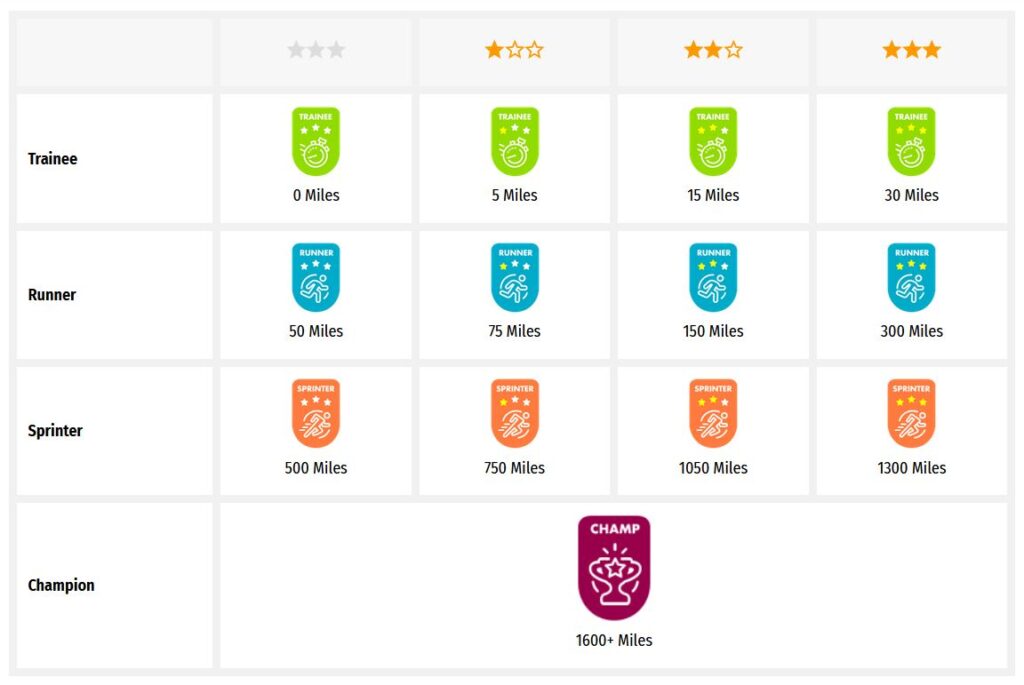Someone else is currently editing this document
Only one person can work on a document at a time
TRANSCRIPTION
pressing a wet cold cloth on the injured area. Pain and bleeding soon diminished. No need
then for a doctor. Luckily I was still wearing my weekday dress. I took it off quickly, hid it
and slipped on my Sunday dress with its white lace collar. What a state that would have been
in had I already changed! As if nothing had happened, I went out to meet mother and help her
carry up the sweet-smelling cakes. She did inquire why my hair was wet, but then father
arrived and the accident sank down into the joyful tumult of his welcome. The memory of this
reunion has remained with me all my life – as well as a small scar on my forehead under the
hairline.
Father was worried about grandmother and Aunt Berta in Enzberg. How had they fared
with the hay harvest and all the summer work on the fields? How had they been able to do
without Wilhelm? Had they been able to get somebody to do his work? Mother reported: It
had indeed been extremely difficult and they would not have managed at all had the Enzberg
parson not intervened on grandmother’s behalf and succeeded in having the Polish prisoner of
war with whom they had all got on so well allocated to the farm on a full-time basis. She
praised Aunt Berta too: “She did the work of two men and is only a young girl after all
entitled to go out and enjoy herself.” Now harvest time was coming and Wilhelm would be
missed most sorely. The big holidays had just started. Father did not hesitate. Mother packed
and only a few days later we were in Enzberg.
Corn harvest on the hill fields
Once again a man was sitting at the head of the family table in the kitchen, and
grandmother was glad to leave the planning of the work to my father. Yet throughout the
whole harvest, we realised that we could not fill the gap created by Wilhelm’s death. For the
reaping there was now only father, the prisoner of war, Aunt Berta and grandmother. At 4 in
the morning they headed off with their scythes and sickles, climbed up the steep road leading
to the elevation over the Enz valley where our cornfield was. Mother and I prepared the big
food basket and the jugs and set out along the same path as soon as it was time for the
morning break. It was half an hour’s walk. After the meal we remained in the field to help. I
laid out the ropes for the sheaves, placing them at equal distances from each other along the
rows of cut corn. The three women followed me, gathered up the corn with both arms, holding
the sickle in their right hands, taking up just the right amount, and laying it gently on the
85
Language(s) of Transcription
LOCATION
ABOUT THIS DOCUMENT
STORY INFORMATION
TRANSCRIPTION
LOCATION
DESCRIPTION
PEOPLE
STORY INFO
TUTORIAL
pressing a wet cold cloth on the injured area. Pain and bleeding soon diminished. No need
then for a doctor. Luckily I was still wearing my weekday dress. I took it off quickly, hid it
and slipped on my Sunday dress with its white lace collar. What a state that would have been
in had I already changed! As if nothing had happened, I went out to meet mother and help her
carry up the sweet-smelling cakes. She did inquire why my hair was wet, but then father
arrived and the accident sank down into the joyful tumult of his welcome. The memory of this
reunion has remained with me all my life – as well as a small scar on my forehead under the
hairline.
Father was worried about grandmother and Aunt Berta in Enzberg. How had they fared
with the hay harvest and all the summer work on the fields? How had they been able to do
without Wilhelm? Had they been able to get somebody to do his work? Mother reported: It
had indeed been extremely difficult and they would not have managed at all had the Enzberg
parson not intervened on grandmother’s behalf and succeeded in having the Polish prisoner of
war with whom they had all got on so well allocated to the farm on a full-time basis. She
praised Aunt Berta too: “She did the work of two men and is only a young girl after all
entitled to go out and enjoy herself.” Now harvest time was coming and Wilhelm would be
missed most sorely. The big holidays had just started. Father did not hesitate. Mother packed
and only a few days later we were in Enzberg.
Corn harvest on the hill fields
Once again a man was sitting at the head of the family table in the kitchen, and
grandmother was glad to leave the planning of the work to my father. Yet throughout the
whole harvest, we realised that we could not fill the gap created by Wilhelm’s death. For the
reaping there was now only father, the prisoner of war, Aunt Berta and grandmother. At 4 in
the morning they headed off with their scythes and sickles, climbed up the steep road leading
to the elevation over the Enz valley where our cornfield was. Mother and I prepared the big
food basket and the jugs and set out along the same path as soon as it was time for the
morning break. It was half an hour’s walk. After the meal we remained in the field to help. I
laid out the ropes for the sheaves, placing them at equal distances from each other along the
rows of cut corn. The three women followed me, gathered up the corn with both arms, holding
the sickle in their right hands, taking up just the right amount, and laying it gently on the
85
- English (English)
pressing a wet cold cloth on the injured area. Pain and bleeding soon diminished. No need
then for a doctor. Luckily I was still wearing my weekday dress. I took it off quickly, hid it
and slipped on my Sunday dress with its white lace collar. What a state that would have been
in had I already changed! As if nothing had happened, I went out to meet mother and help her
carry up the sweet-smelling cakes. She did inquire why my hair was wet, but then father
arrived and the accident sank down into the joyful tumult of his welcome. The memory of this
reunion has remained with me all my life – as well as a small scar on my forehead under the
hairline.
Father was worried about grandmother and Aunt Berta in Enzberg. How had they fared
with the hay harvest and all the summer work on the fields? How had they been able to do
without Wilhelm? Had they been able to get somebody to do his work? Mother reported: It
had indeed been extremely difficult and they would not have managed at all had the Enzberg
parson not intervened on grandmother’s behalf and succeeded in having the Polish prisoner of
war with whom they had all got on so well allocated to the farm on a full-time basis. She
praised Aunt Berta too: “She did the work of two men and is only a young girl after all
entitled to go out and enjoy herself.” Now harvest time was coming and Wilhelm would be
missed most sorely. The big holidays had just started. Father did not hesitate. Mother packed
and only a few days later we were in Enzberg.
Corn harvest on the hill fields
Once again a man was sitting at the head of the family table in the kitchen, and
grandmother was glad to leave the planning of the work to my father. Yet throughout the
whole harvest, we realised that we could not fill the gap created by Wilhelm’s death. For the
reaping there was now only father, the prisoner of war, Aunt Berta and grandmother. At 4 in
the morning they headed off with their scythes and sickles, climbed up the steep road leading
to the elevation over the Enz valley where our cornfield was. Mother and I prepared the big
food basket and the jugs and set out along the same path as soon as it was time for the
morning break. It was half an hour’s walk. After the meal we remained in the field to help. I
laid out the ropes for the sheaves, placing them at equal distances from each other along the
rows of cut corn. The three women followed me, gathered up the corn with both arms, holding
the sickle in their right hands, taking up just the right amount, and laying it gently on the
85
Language(s) of Transcription
English Translation
Transcription History
pressing a wet cold cloth on the injured area. Pain and bleeding soon diminished. No need then for a doctor. Luckily I was still wearing my weekday dress. I took it off quickly, hid it and slipped on my Sunday dress with its white lace collar. What a state that would have been in had I already changed! As if nothing had happened, I went out to meet mother and help her carry up the sweet-smelling cakes. She did inquire why my hair was wet, but then father arrived and the accident sank down into the joyful tumult of his welcome. The memory of this reunion has remained with me all my life – as well as a small scar on my forehead under the hairline. Father was worried about grandmother and Aunt Berta in Enzberg. How had they fared with the hay harvest and all the summer work on the fields? How had they been able to do without Wilhelm? Had they been able to get somebody to do his work? Mother reported: It had indeed been extremely difficult and they would not have managed at all had the Enzberg parson not intervened on grandmother’s behalf and succeeded in having the Polish prisoner of war with whom they had all got on so well allocated to the farm on a full-time basis. She praised Aunt Berta too: “She did the work of two men and is only a young girl after all entitled to go out and enjoy herself.” Now harvest time was coming and Wilhelm would be missed most sorely. The big holidays had just started. Father did not hesitate. Mother packed and only a few days later we were in Enzberg. Corn harvest on the hill fields Once again a man was sitting at the head of the family table in the kitchen, and grandmother was glad to leave the planning of the work to my father. Yet throughout the whole harvest, we realised that we could not fill the gap created by Wilhelm’s death. For the reaping there was now only father, the prisoner of war, Aunt Berta and grandmother. At 4 in the morning they headed off with their scythes and sickles, climbed up the steep road leading to the elevation over the Enz valley where our cornfield was. Mother and I prepared the big food basket and the jugs and set out along the same path as soon as it was time for the morning break. It was half an hour’s walk. After the meal we remained in the field to help. I laid out the ropes for the sheaves, placing them at equal distances from each other along the rows of cut corn. The three women followed me, gathered up the corn with both arms, holding the sickle in their right hands, taking up just the right amount, and laying it gently on the 85
pressing a wet cold cloth on the injured area. Pain and bleeding soon diminished. No need then for a doctor. Luckily I was still wearing my weekday dress. I took it off quickly, hid it and slipped on my Sunday dress with its white lace collar. What a state that would have been in had I already changed! As if nothing had happened, I went out to meet mother and help her carry up the sweet-smelling cakes. She did inquire why my hair was wet, but then father arrived and the accident sank down into the joyful tumult of his welcome. The memory of this reunion has remained with me all my life – as well as a small scar on my forehead under the hairline. Father was worried about grandmother and Aunt Berta in Enzberg. How had they fared with the hay harvest and all the summer work on the fields? How had they been able to do without Wilhelm? Had they been able to get somebody to do his work? Mother reported: It had indeed been extremely difficult and they would not have managed at all had the Enzberg parson not intervened on grandmother’s behalf and succeeded in having the Polish prisoner of war with whom they had all got on so well allocated to the farm on a full-time basis. She praised Aunt Berta too: “She did the work of two men and is only a young girl after all entitled to go out and enjoy herself.” Now harvest time was coming and Wilhelm would be missed most sorely. The big holidays had just started. Father did not hesitate. Mother packed and only a few days later we were in Enzberg. Corn harvest on the hill fields Once again a man was sitting at the head of the family table in the kitchen, and grandmother was glad to leave the planning of the work to my father. Yet throughout the whole harvest, we realised that we could not fill the gap created by Wilhelm’s death. For the reaping there was now only father, the prisoner of war, Aunt Berta and grandmother. At 4 in the morning they headed off with their scythes and sickles, climbed up the steep road leading to the elevation over the Enz valley where our cornfield was. Mother and I prepared the big food basket and the jugs and set out along the same path as soon as it was time for the morning break. It was half an hour’s walk. After the meal we remained in the field to help. I laid out the ropes for the sheaves, placing them at equal distances from each other along the rows of cut corn. The three women followed me, gathered up the corn with both arms, holding the sickle in their right hands, taking up just the right amount, and laying it gently on the 85
Document Date
Document Type
Document Description
Language of Description
Keywords
External Web Resources
Story Description
English translation of Eine Kindheit im Ersten Weltkrieg by Else Wuergau The book deals with the impact of the beginning of the war on the idyllic life of a large family of farmers. The main characters are the parents of the narrator: the father a village schoolteacher, from 1916 medical orderly at the Somme front, and the widowed grandmother with her six children. Three of the four daughters have families of their own; the youngest tends to the wounded and becomes a Red Cross nurse. The unmarried eldest son manages the large family farm in Enzberg and is therefore dispensed from military service. The youngest boy, only fifteen years old at the outbreak of the war, joins up voluntarily. In 1917 the eldest becomes unable to withstand the burden of his responsibilities and puts an end to his life. The farm has to be sold; the purchaser pays in war bonds, the value of which are shortly afterwards reduced to virtually nothing. The youngest son is killed in action in Belgium just before the armistice. Available in PDF (13 MB) => http://www.kindheit.stefanmart.de/index_en.html
English Translation
English translation of Eine Kindheit im Ersten Weltkrieg by Else Wuergau The book deals with the impact of the beginning of the war on the idyllic life of a large family of farmers.
The main characters are the parents of the narrator: the father a village schoolteacher, from 1916 medical orderly at the Somme front, and the widowed grandmother with her six children.
Three of the four daughters have families of their own; the youngest tends to the wounded and becomes a Red Cross nurse.
The unmarried eldest son manages the large family farm in Enzberg and is therefore dispensed from military service.
The youngest boy, only fifteen years old at the outbreak of the war, joins up voluntarily.
In 1917 the eldest becomes unable to withstand the burden of his responsibilities and puts an end to his life.
The farm has to be sold; the purchaser pays in war bonds, the value of which are shortly afterwards reduced to virtually nothing.
The youngest son is killed in action in Belgium just before the armistice.
Available in PDF (13 MB) => http://www.kindheit.stefanmart.de/index_en.html
Automatically Identified Enrichments
Verify Automatically Identified Enrichments
Title
A German Childhood in the First World War by Else Wuergau
Source
UGC
Contributor
europeana19141918:agent/7b885d3c89fea22cc4464b11e351687a
Date
1914-08
1918-11
Type
Story
Language
deu
eng
Deutsch
English
Country
Europe
DataProvider
Europeana 1914-1918
Provider
Europeana 1914-1918
Rights
http://creativecommons.org/publicdomain/zero/1.0/ http://creativecommons.org/licenses/by-sa/3.0/DatasetName
2020601_Ag_ErsterWeltkrieg_EU
Begin
1914-08
End
1918-11
Language
mul
Agent
Friedrich Rutsch | europeana19141918:agent/6dc9dd3b90b0cfd88a619a7fd81bc8ed
Rainer Würgau | europeana19141918:agent/7b885d3c89fea22cc4464b11e351687a
Else Rutsch | europeana19141918:agent/c6ff6e707355ad2e93a0c7a45c442b0d
Created
2019-09-11T08:28:08.511Z
2020-02-25T08:25:27.597Z
2016-10-13 05:32:07 UTC
2016-10-13 05:53:20 UTC
Provenance
INTERNET
Germany, Wuerttemberg, Hohenklingen, Enzberg (48.9347, 8.79886)
Story Location
Verify Automatically Identified Locations
People
Berta Kopp
Wilhelm Kopp (Death: 04/05/1917, Enzberg)
Verify Automatically Identified Persons
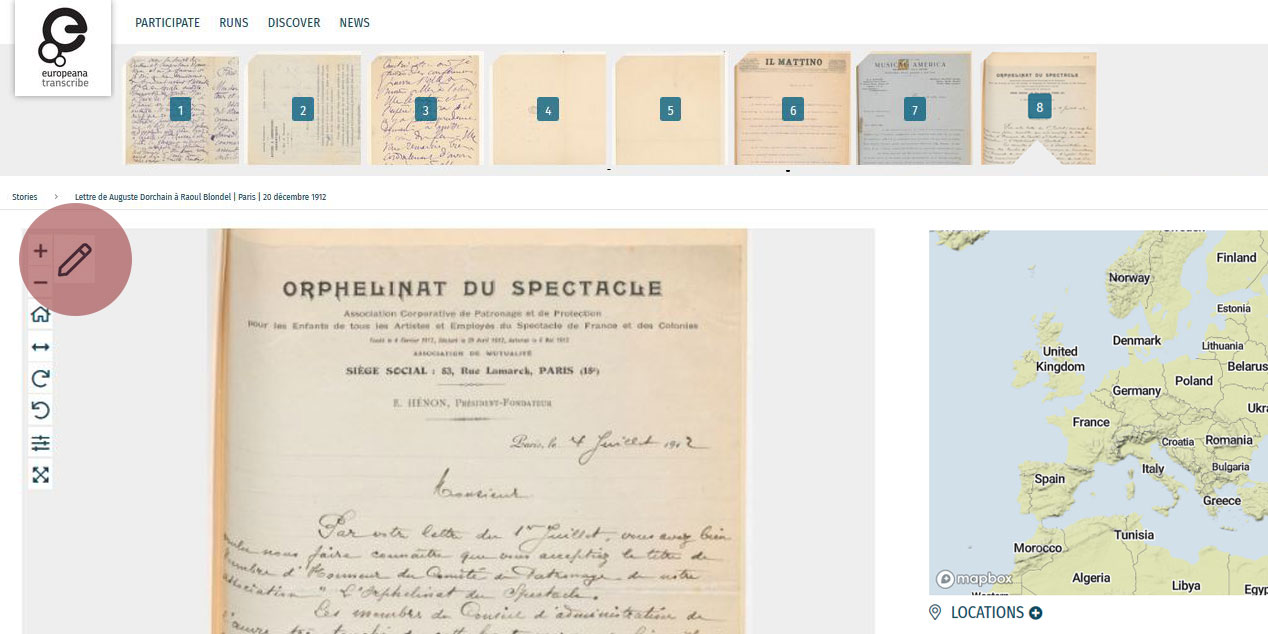
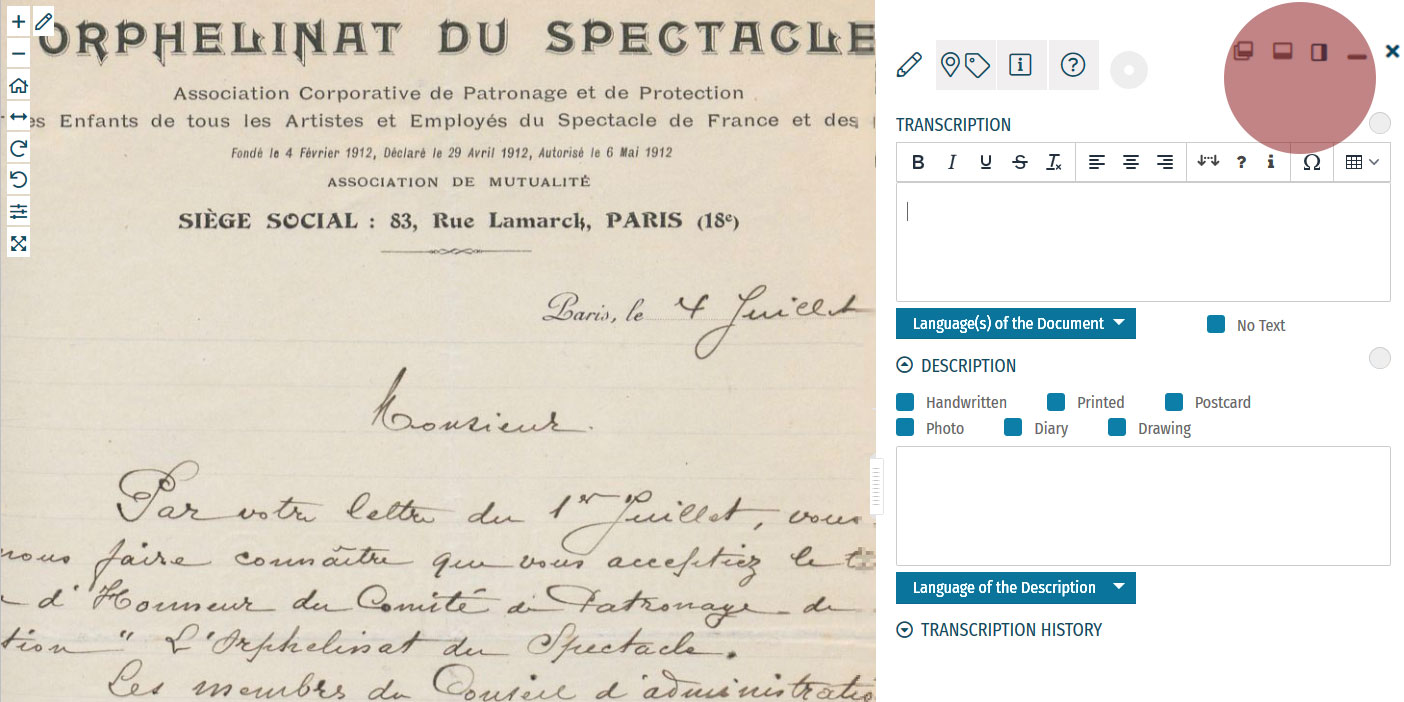
Enrichment Mode
Edit your workspace view by using the top-right menu.
You can have the white Activity Panel docked to the right (default) , to the bottom , or as an independent overlay . If you just want to view the image, you can hide the panel using the minimise button , and then re-open it with the pen button. Adjust the size and position of your Activity Panel according to your preferences.
You enrich documents by following a step-by-step process.
Make sure you regularly save your enrichments in each step to avoid the risk of losing your work.
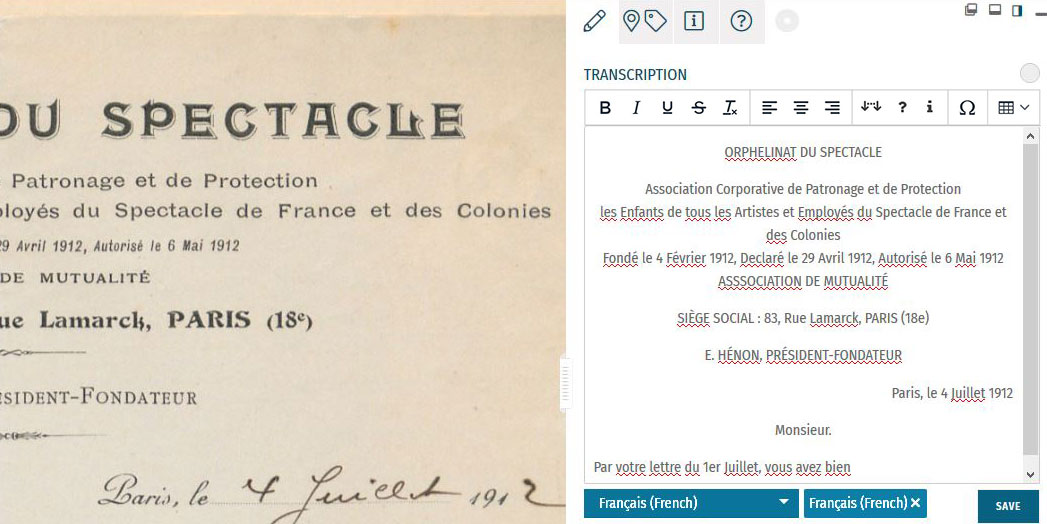
Step 1: Transcription
To start a transcription, select the transcription tab at the top menu of the Activity Panel. Click inside the box underneath the heading TRANSCRIPTION and start writing your transcription. When needed, use the toolbar to format your text and to add special characters and tables. A guide to the transcription toolbar is available in the Formatting section of this tutorial.
Identify the language(s) of the text using the dropdown list under the transcription box. You can select multiple languages at once.
If the item has no text to transcribe, tick the checkbox ‘No Text’.
Once you have finished your transcription, click SAVE.
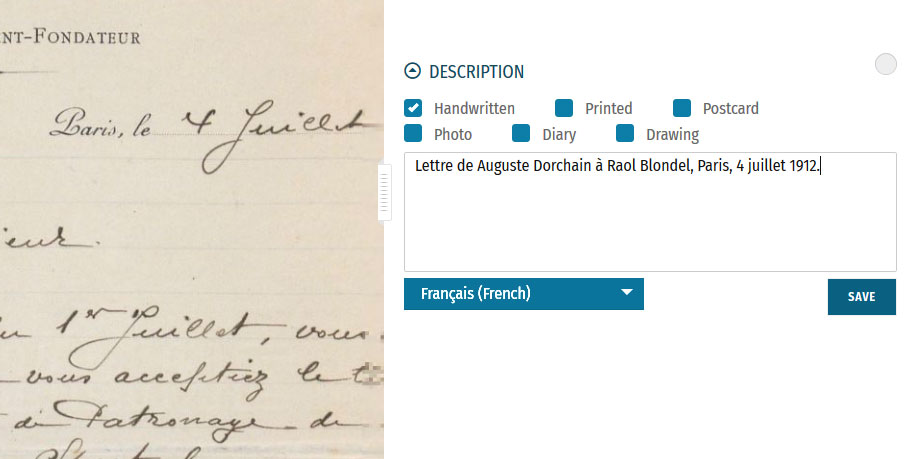
Step 2: Description
You can add a description to the item underneath the Transcription section.
The first task is to identify what type of document the item is: a handwritten or printed document, a postcard, photo, drawing and/or part of a diary. Tick the category which best applies to the item. Multiple categories can be selected at once.
The second task is to write a description of the contents. Click inside the box underneath the heading DESCRIPTION. Here, you can write what the item is, what it is about, and specify the images and objects that appear in the item.
Identify the language of the description text that you wrote using the dropdown list underneath. You can only select one language.
Once you have finished your description, click SAVE.

Step 3: Location
If you find a location mentioned or recognise a place in the item, you can create a geotag and pin it to the item map. Multiple locations can be attached to the item. To tag locations, select the tagging tab at the top menu of the Activity Panel. Click the plus next to the heading LOCATIONS. Type the location into the search bar and select the result that best applies. A new pin will be placed into the map. The location name should be a clear georeference, e.g. a country, city or address. Make adjustments to the location name if necessary. You can also adjust the position of the pin by dragging it on the map. If you want to add further details to the location, you can write a (short) description. This could include extra information about the geotag (e.g. the building name or a significant event that took place at the location) or the relevance of the place to the item (e.g. the hometown of the author). You can also add a Wikidata reference to link the location to a stable source. Search for the reference using the Wikidata fields. Once you have finished your location tag, click SAVE. You can find the place(s) tagged to the item in grey at the bottom of the Location(s) section.Step 4: Tagging
Below the Locations section is the Tagging section, where you can add the following annotations:
 Document Date:
Document Date:Here, you can add dates that correspond to the item. This could include the dates mentioned in the text (e.g. in diary pages), the date of a related historical event (e.g. the end of WWI), or when the item was created (e.g. from a dated signature on an illustration). You can either define this as a single date or as a longer time frame.
To tag dates to the item, write the start and end dates in DD/MM/YYYY format in the fields or select the dates by clicking on the calendar.
If you only have one date to add, insert the same date into both start and end fields.
If you don’t know the exact days, you can also tag the date on the scale of months (MM/YYYY) or years (YYYY).
Once you have finished your date tag, click SAVE DATE.
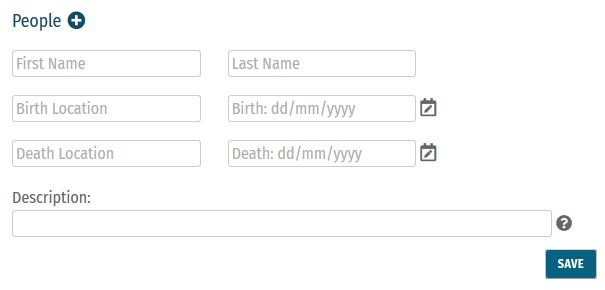 People:
People:People mentioned as creators or subjects in the item can also be tagged. Depending on the information you might have, you can enter the person’s first and last names, as well as their dates of birth and death. There is also the option to write a short description of the person, explaining who they are or their relevance to the item, e.g. the person’s occupation or their relation to another tagged person.
Multiple people can be tagged to one item.
Once you have finished your person tag, click SAVE.
 Keywords:
Keywords:Here, you can freely add keywords related to the topic and content of the item. This could include particular themes (e.g. art, music, war), subjects (e.g. children, cooking, France), or particular historical affiliations (e.g. 20th century, Austro-Hungarian Empire, Fall of the Iron Curtain).
Multiple keywords can be added and they can be written in any language.
Write your keyword tag into the field and click SAVE.
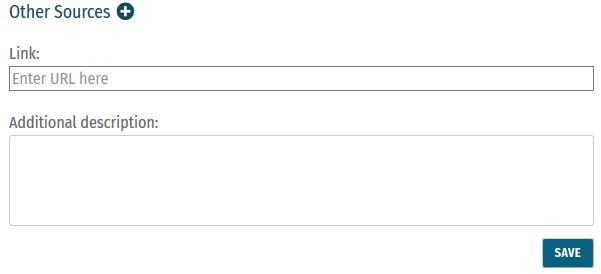 Other Sources:
Other Sources:External websites with information about the item’s content can be linked here. This could include links to further data about a person mentioned, a particular historical event or links to digital versions of newspapers that appear in photos or clippings in a notebook.
To add a link, click the plus next to the heading ‘Other Sources’. Enter the URL into the Link field, and write a short description of this link in the Additional Description field.
Multiple links can be tagged to one item.
Once you have finished your tag, click SAVE.
Step 5: Mark for Review
Once you have saved your contribution, the task will automatically change to the Edit status. If you think the task is finished, you can mark it for review. Note that you have to be at Runner level or above to do this (see: Miles and Levels). Click on the yellow circle next to the section heading and select Review in the list that appears. The task now needs to go under Review by another volunteer.Formatting
Review
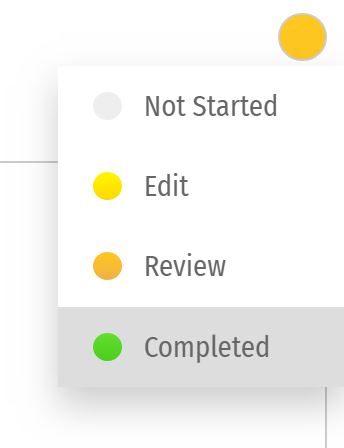 All enrichments need to be edited and reviewed by more than one volunteer to ensure that they are as accurate as possible.
Only Sprinters and Champions can edit tasks in the Review stage and mark them as Complete. (see: Miles and Levels)
You can review a task (Transcription, Description, Locations, or Tagging) when the circle next to the heading is coloured orange .
During the review process, pay close attention to the following requirements:
All enrichments need to be edited and reviewed by more than one volunteer to ensure that they are as accurate as possible.
Only Sprinters and Champions can edit tasks in the Review stage and mark them as Complete. (see: Miles and Levels)
You can review a task (Transcription, Description, Locations, or Tagging) when the circle next to the heading is coloured orange .
During the review process, pay close attention to the following requirements:
-
- Transcription: The complete text in the item has been properly transcribed and the transcription is formatted as accurately as possible. The correct language(s) are selected and the transcription contains no missing or unclear icons.
-
- Description: The description is accurate and detailed (especially items without text to transcribe, e.g. photos), and the appropriate categories have been ticked.
-
- Location(s): All locations have been correctly tagged. The location name is accurate and matches the coordinates and the pin on the map. The description is clear and concise, and the Wikidata reference (if any) is correct.
-
- Tagging: Document dates are completed and as precise as possible. All mentioned people are tagged and their data is correct. All added keywords are applicable to the item, and other sources have accurate information and functioning links.
Completion Statuses
| GREY |
| 1. NOT STARTED |
| Tasks have not been started. |
| YELLOW |
| 2. EDIT MODE |
| Tasks have been started, but not yet finished. Additions and edits can still be made. |
| ORANGE |
| 3. REVIEW |
| Tasks are finished, but need final review by Sprinter or Champion transcribers. |
| GREEN |
| 4. COMPLETED |
| Tasks have been fully completed and reviewed. No further changes need to be made. |
Miles and Levels
Transcribathon is a competitive marathon. You do not enrich documents alone, but compete and work with other volunteers to ensure the quality of your work. When you first create a Transcribathon account, you only have the ability to start and edit tasks. The more you enrich documents, the closer you become to advancing to a higher level, which can unlock abilities like reviewing and completing tasks.| Level | Abilities |
|---|---|
| Trainee | Basic abilities: start and edit tasks |
| Runner | Basic abilities, mark finished tasks for review |
| Sprinter | All Runner abilities, mark reviewed annotations as completed |
| Champion | All Sprinter abilities, mark reviewed transcriptions as completed |
| Tasks | Miles Received |
|---|---|
| Transcription | 1 Mile for every 300 characters transcribed |
| Description | 1 Mile for every 5 Descriptions added |
| Location | 1 Mile for every 5 Locations added |
| Tagging | 1 Mile for every 5 Tags added |
| Reviewing | 1 Mile for every 10 items marked as complete |
